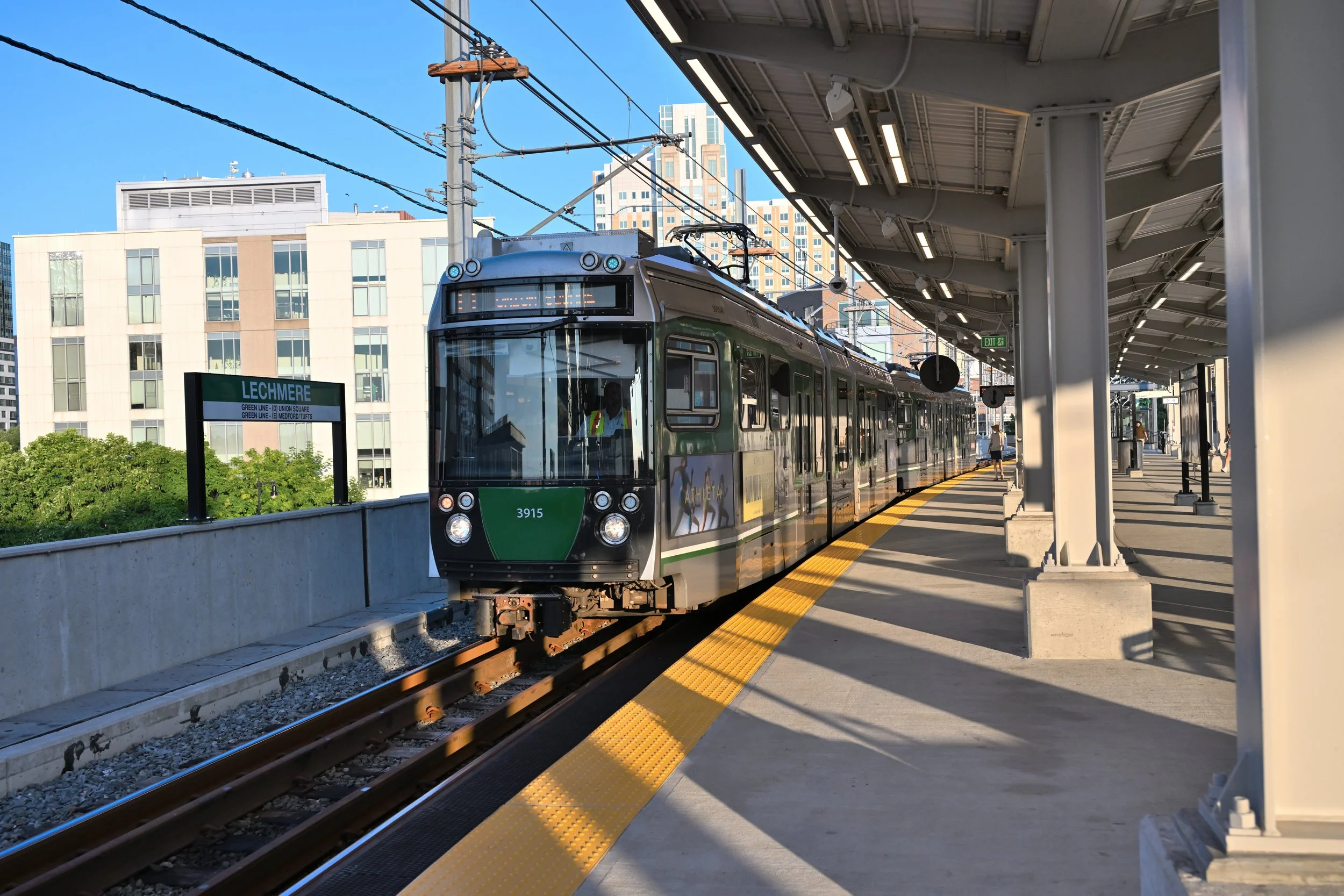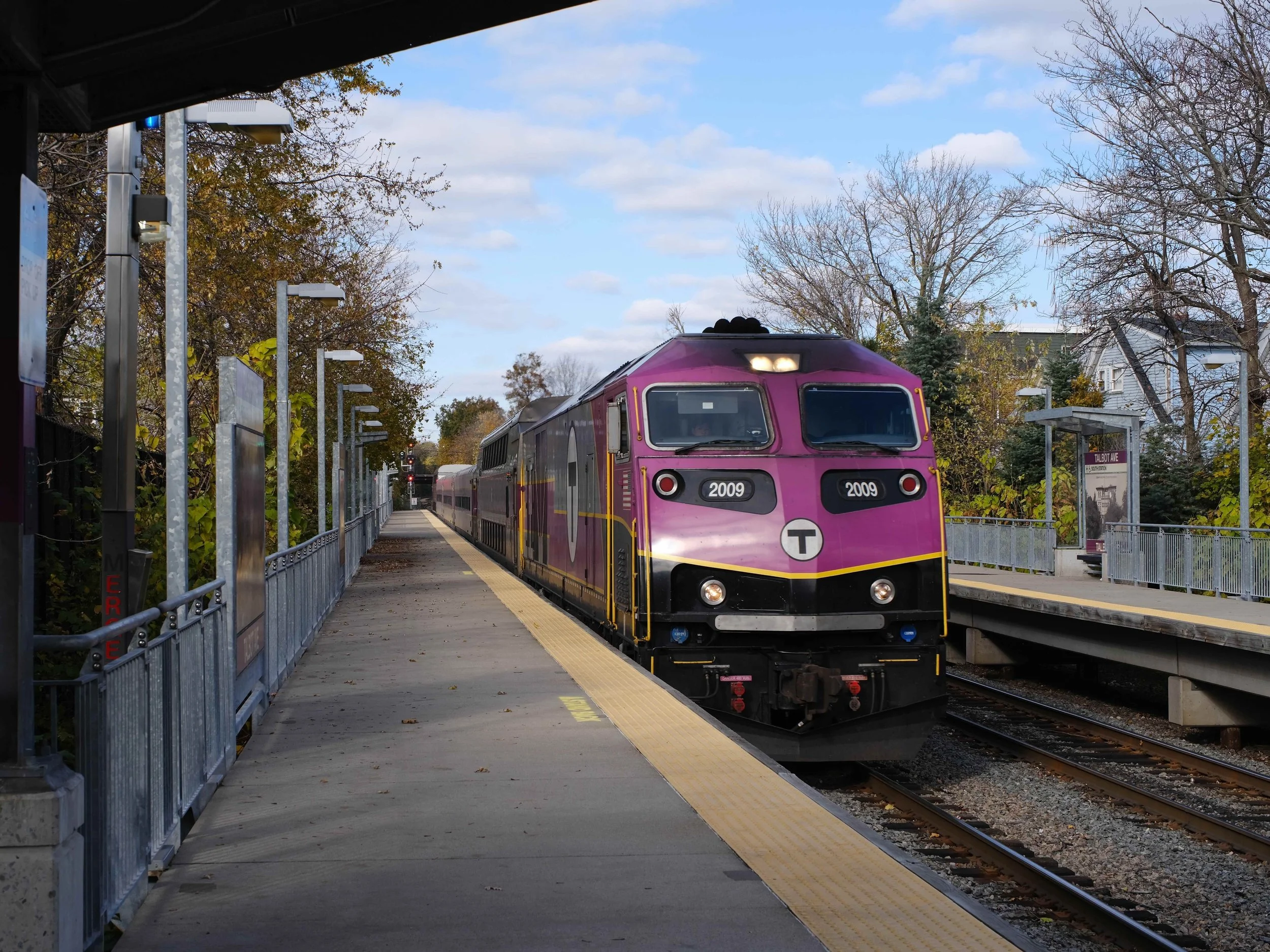
Media Statement: Green Line Derailment
This derailment highlights the urgent need for the long-overdue overhaul of the Green Line’s signal system. An upgraded system would likely have mitigated the overspeed that led to this derailment and could prevent similar incidents from occurring in the future.
BOSTON, October 17, 2024— TransitMatters is deeply disappointed to learn that the recent Green Line derailment resulted from excessive speed and operational negligence. This incident underscores the need for the MBTA to reinforce strict adherence to safety protocols across all levels of its operations.
We strongly urge the MBTA to commit to a thorough review of its training and operational oversight to ensure that all operators follow established safety rules. The safety of riders and employees alike must remain a top priority, and these incidents must be prevented at all costs.
While operator negligence appears to have been a key factor in this derailment, we hope that the MBTA is also examining the low-speed design of the switch where this event occurred. A design review could lead to adjustments that accommodate higher operating speeds, improving efficiency on the line and reducing the risk of future incidents.
Additionally, this derailment highlights the urgent need for the long-overdue overhaul of the Green Line’s signal system. An upgraded system would likely have mitigated the overspeed that led to this derailment and could prevent similar incidents from occurring in the future. Signal modernization must remain a top priority for the T, which requires sustained financial and operational commitment.
Lastly, we caution the MBTA against implementing performative or reactionary "safety measures" that would unnecessarily disrupt service on the Green Line without addressing core issues. Genuine improvements come from long-term, sustainable solutions, not quick fixes.
The MBTA’s funding model is fundamentally flawed. Without a shift toward long-term, stable financing, the T will continue to face challenges in completing the safety upgrades that are so clearly needed. We call on our leaders to provide the resources necessary to keep our transit system safe, reliable, and efficient for all riders.
For media inquiries, please e-mail media@transitmatters.org.
Photo Credit: James Wang
Media Statement: TransitMatters Celebrates the First Real Steps Towards Regional, Electrified Service on the Fairmount Line
"This monumental step represents the first real commitment to the Regional Rail vision laid out five years ago. [TransitMatters is] excited that the T is partnering with Keolis to test new technology that allows us to electrify the service faster and bring tangible benefits to riders.”
BOSTON, July 25, 2024 — TransitMatters is excited to celebrate the MBTA Board's approval of Commuter Rail operator Keolis’s plan to introduce battery-electric trains to the Fairmount Line by 2028. This landmark decision sets the stage for more frequent, fast, and reliable service, bringing us closer to a decarbonized and modernized regional rail network.
Today’s vote marks the first significant investment toward the Regional Rail vision. The Fairmount Line was one of three lines, along with the Newburyport/Rockport line to Beverly, that the MBTA’s then-board endorsed for Regional Rail service in 2019. As the fastest-growing Commuter Rail line, with over 100% of pre-COVID level ridership, the Fairmount Line is moving toward 20-minute service by 2028. This will provide subway-style frequencies and a high-quality transit option to communities that have long gone without the transit options they deserve.
"This monumental step represents the first real commitment to the Regional Rail vision laid out five years ago. We're excited that the T is partnering with Keolis to test new technology that allows us to electrify the service faster and bring tangible benefits to riders," said Jarred Johnson, Executive Director of TransitMatters.
"Keolis's innovation proposal will make a world of difference to communities along the Fairmount Line with fast, frequent, and reliable service. It's the first real step toward Regional Rail and a meaningful down payment on an entirely new Regional Rail system for the Commonwealth. We applaud Keolis and the MBTA for their vision here and look forward to seeing similar vision throughout the upcoming operator reprocurement process," stated Jackson Moore Otto, Regional Rail Lead.
Introducing battery-electric trains to the Fairmount Line is a significant milestone in the MBTA’s efforts to transform the Commuter Rail system. The new service is expected to reduce fuel consumption by 1.6 million gallons and cut carbon dioxide emissions by 17,700 tons annually compared to diesel trains. Fairmount Line riders will have modern trains that will allow for faster, smoother, quieter trips and more reliable service.
"This pilot delivers on the Regional Rail vision despite the T's funding challenges. We appreciate the hard work of the General Manager and his team, the folks at Keolis, and the Rail Transformation for making this happen," added Johnson.
This pilot project is a significant step forward for the Fairmount Line and a scalable model for electrification across the entire commuter rail network. It will allow the MBTA to move existing equipment to other lines and use spare BEMUs for further pilots.
"Regional Rail has the power to revolutionize how people get around Eastern and Central Massachusetts. This announcement, along with the addition of 30-minute service on the Fairmount Line and most hours on the Newburyport/Rockport trunk paired with real investments in 'no regrets' infrastructure across the network, are encouraging steps that show real progress on Regional Rail," said Tim Lawrence, Board President of TransitMatters.
We are grateful to our partners at the Fairmount Indigo Transit Coalition for their tireless advocacy. We applaud the T and Keolis for their vision in advancing this innovative and realistic proposal. Regional Rail is coming, and it can’t come soon enough.
For more information about the Regional Rail advocacy and the vision behind this transformative initiative, please visit TransitMatters Regional Rail Advocacy.
For media inquiries, please e-mail media@transitmatters.org.
###
Media Statement: Blue Hill Avenue Center-Running Bus Lane
The Blue Hill Ave dedicated bus lane, along with the project’s other mobility upgrades, is a major advancement essential to supporting historically disinvested communities.
BOSTON, March 5, 2024 — We are pleased that the City of Boston has officially confirmed the transformation of Blue Hill Avenue into a multimodal corridor, equipped with center-running dedicated bus lanes, that improves safety and efficiency for all. Serving more than 37,000 riders each weekday, Blue Hill Ave is a crucial corridor that connects the Roxbury, Dorchester, and Mattapan neighborhoods. Many buses including the 28, 29, and 31 utilize the Blue Hill Ave corridor but often experience delay and unreliability. The 28 bus has the highest ridership in the MBTA network and serves mostly low-income and transit dependent riders, but it experiences severe bus bunching and slowdowns along its route due to the lack of bus priority.
Aging infrastructure along Blue Hill Ave has created safety concerns for drivers, transit users, and pedestrians alike. This investment, with funding from the City of Boston, the federal government, and the MBTA, will improve mobility in Roxbury, Dorchester, and Mattapan. Through the implementation of this bus lane, significant time savings will be had by its thousands of riders, further promoting equity in the MBTA bus network as Black riders spend significantly more time on buses than white riders. The Blue Hill Ave dedicated bus lane, along with the project’s other mobility upgrades, is a major advancement essential to supporting historically disinvested communities.
TransitMatters applauds the City of Boston for its robust community engagement process, which helped shape this project. The modernization of Blue Hill Ave will promote mobility and transform it into a multimodal corridor that prioritizes safety and accessibility for everyone. We're excited to see the additional beautification elements that along with the transportation improvements, will support local businesses and make the corridor more vibrant and livable.
TransitMatters supports implementing bus priority measures, such as center-running dedicated bus lanes, to increase reliability and protect buses as a dignified transit option. The success of this project will improve experiences for those of all modes, bus riders, pedestrians, cyclists, and drivers, and create a safer and more livable corridor in the Roxbury, Dorchester, and Mattapan neighborhoods.
For media inquiries, please e-mail media@transitmatters.org.
###
Photo credit: James Wang
Categories
- Children (1)
- Diversions (1)
- Olympics (1)
- MAPC (2)
- Red–Blue Connector (2)
- Urban Design (3)
- Bus (4)
- Fares (4)
- Late Night Service (4)
- MBTA ROC (4)
- Silver Line (4)
- Snow (5)
- Blue Line (8)
- Emergency (8)
- Orange Line (8)
- Public Comment (8)
- Maintenance (9)
- Operations (9)
- Signage (9)
- Fare Collection (10)
- Labs (11)
- Safety (11)
- Planning (12)
- Communication (14)
- MBCR (14)
- MassDOT (14)
- Green Line (16)
- History & Culture (16)
- Red Line (18)
- MBTA Bus (21)
- Commuter Rail (24)
- Advocacy (26)
- Capital Construction (28)
- Politics (30)
- Podcast (35)
- News (38)
- Media (40)
- Funding (42)
- Statements (50)
- MBTA (57)



